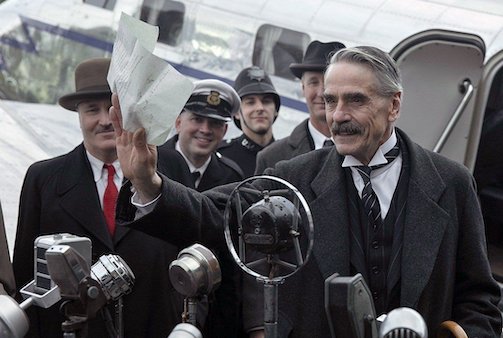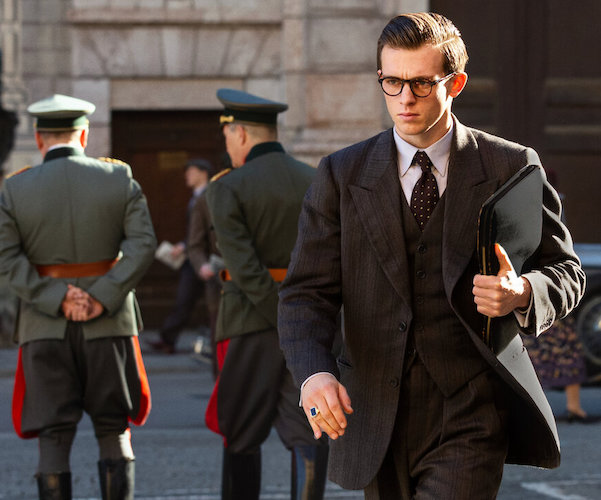Film Review: “Munich: The Edge of War” — The Necessity of Resistance
By Peg Aloi
A suspenseful, finely crafted historical thriller reminds us that the triumph of evil depends on good men doing nothing.
Munich: The Edge of War, directed by Christian Schwochow. Streaming on Netflix.

Prime minister Neville Chamberlain, played by Jeremy Irons, in Munich: The Edge of War. Photo: Netflix
It’s an oft-cited hypothetical question: if you could travel back in time and had the opportunity to kill Hitler, would you do it? German filmmaker Christian Schwochow thoughtfully probes this question in a suspenseful, finely crafted historical thriller based on Robert Harris’s novel. The film’s prologue is set in 1932: three friends are celebrating their graduation from Oxford at a decadent party on the lawns, swiping bottles of champagne and cavorting as fireworks go off in the background. There’s an air of hope and excitement. Hugh (1917’s George Mackay) is English, and German friends Paul (Jannis Niewohner, an actor new to me but worth watching) and Lenya (Babylon Berlin’s Liv Lisa Fries) are arguing about the rising nationalist movement in Germany. The banter is good-natured at first but, when Lenya calls the nationalists “racists and thugs,” Paul takes offense and Hugh seems somewhat troubled. Still, the friends make up quickly. It’s one of those moments typical of college students: the world is before them — everything is both serious and lighthearted. The trio is clearly ready to take the world by storm, armed with youthful passion and driven by fiery ideology. There is a closeness and chemistry among the three that is charismatic and alluring. Given the backdrop, the slow but inevitable build-up to WWII, we know that their idealism will be overshadowed by darker forces.
Fast forward to 1938: Hugh is working as a secretary to Prime Minister Neville Chamberlain, played by Jeremy Irons. Chamberlain, like other world leaders at the time, seems unaware of the depth of Hitler’s monstrousness, which lends an exquisite yet also maddening tension to his actions. Irons brings the perfect amount of warmth and humor to this otherwise rather prim portrayal. As his assistant, Hugh keeps long hours that affect the tranquility of his home life with his wife and young son. Jessica Brown Findlay (Harlots) has too little screen time as Hugh’s wife Pamela, who questions her husband’s increasing need to be secretive and at the beck and call of 10 Downing Street, even on their wedding anniversary. Meanwhile, Paul is working for the German government as a translator, but is involved in an underground resistance movement that seeks to halt Hitler’s rise to power. His love of country initially fueled his allegiance to the nationalist movement but, as he learns more about the movement’s repugnant values, he wants to be on the right side of history. Paul’s meetings with fellow resisters as they work out their plans to undermine Hitler’s military movements, including an imminent invasion of Czechoslovakia, give Munich the taut mood of a spy thriller. The sharp and impressive production design, along with Isobel Waller-Bridge’s thrilling score, give this film historical heft and weight.
As the build-up to the war in Europe intensifies, Hugh and Paul are both caught up in the social and political urgency. By random chance both of these young men, once close friends in school, find themselves meeting again. In London, Hugh’s wife is increasingly frustrated by his silence and absence, whereas in Berlin, Paul finds himself drawn into a plot to stop Hitler at all costs. It is suggested that their friendship cooled somewhat during Paul’s early loyalty to the nationalist movement. Both are close to the key players in the unfolding path to war, which places them in the inner sanctum at two crucial meetings leading up to Hitler’s planned invasion. When they unexpectedly lay eyes on one another — in their roles as government employees caught in the maelstrom of what we know to be an impending disaster — the scenes take on an air of prophecy.

Jannis Niewohner in Munich. Photo: Netflix
The Oxford prologue turns out to provide a way to understand what motivates these young men a few years later. Lenya plays a part in this reunion as well, but her fate is a tragic one brought about by the Third Reich. As they were lovers for a time, Lenya’s misfortune propels Paul’s determination to aid the resistance. It also convinces Hugh he has no choice but to act. Prior to his attending the diplomatic meeting where he encounters Hugh, Paul’s coworker and lover Mrs. Winter (Sandra Hüller in a small but juicy role) gives him a top secret document that lays out Hitler’s grand scheme in horrifying black and white. Paul shares it with Hugh, despite the danger of discovery — he knows he can trust him. The two men share only a brief time together but it is intense. Their six-year separation fades away — their loyalty, to their countries and to each other, spurs them on.
But the Nazis know of the resistance: Paul and Hugh’s every movement, even a glance or word, is under scrutiny. Both characters have moments in which they speak to Adolf Hitler, who is well played by Ulrich Matthes. The tyrant is subtly menacing and almost perversely self-aware. Munich: The Edge of War builds, effectively, to a crucial moment of action which, of course, fails to stop Hitler’s rise to power. Despite our knowing the finality of the catastrophe, the film’s ending comes off as anticlimactic and unsatisfying. Text is provided to explain how the Nazi resistance movement prevented a worse outcome. But how could the outcome have been worse? Still, the fateful meeting of Paul and Hugh makes a powerful and timely point in these challenging times: a reminder of the old adage that the only thing necessary for the triumph of evil is for good men to do nothing.
Peg Aloi is a former film critic for the Boston Phoenix and member of the Boston Society of Film Critics. She taught film studies in Boston for over a decade. She writes on film, TV, and culture for web publications like Vice, Polygon, Bustle, Mic, Orlando Weekly, Crooked Marquee, and Bloody Disgusting. Her blog “The Witching Hour” can be found at themediawitch.com.
Tagged: Christian Schwochow, hitler, Jeremy Irons, Munich: The Edge of War
